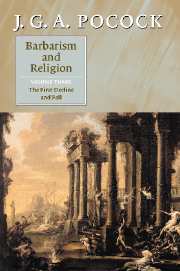Book contents
- Frontmatter
- Contents
- Acknowledgements
- Note on usages
- List of abbreviations
- Introduction
- PROLOGUE
- 1 Gibbon's first volume: the problem of the Antonine moment
- PART I THE FIRST DECLINE AND FALL: ANCIENT PERCEPTIONS
- PART II THE AMBIVALENCE AND SURVIVAL OF CHRISTIAN EMPIRE
- 5 Orosius and Augustine: the formation of a Christian anti-history
- 6 Otto of Freising and the two cities
- 7 The historiography of the translatio imperii
- PART III THE HUMANIST CONSTRUCTION OF DECLINE AND FALL
- PART IV EXTENSIVE MONARCHY AND ROMAN HISTORY
- PART V REPUBLIC AND EMPIRE: THE ENLIGHTENED NARRATIVE
- PART VI GIBBON AND THE STRUCTURE OF DECLINE
- EPILOGUE
- Bibliography of works cited
- Index
6 - Otto of Freising and the two cities
Published online by Cambridge University Press: 15 December 2009
- Frontmatter
- Contents
- Acknowledgements
- Note on usages
- List of abbreviations
- Introduction
- PROLOGUE
- 1 Gibbon's first volume: the problem of the Antonine moment
- PART I THE FIRST DECLINE AND FALL: ANCIENT PERCEPTIONS
- PART II THE AMBIVALENCE AND SURVIVAL OF CHRISTIAN EMPIRE
- 5 Orosius and Augustine: the formation of a Christian anti-history
- 6 Otto of Freising and the two cities
- 7 The historiography of the translatio imperii
- PART III THE HUMANIST CONSTRUCTION OF DECLINE AND FALL
- PART IV EXTENSIVE MONARCHY AND ROMAN HISTORY
- PART V REPUBLIC AND EMPIRE: THE ENLIGHTENED NARRATIVE
- PART VI GIBBON AND THE STRUCTURE OF DECLINE
- EPILOGUE
- Bibliography of works cited
- Index
Summary
Seven hundred years separate the histories of Orosius and Otto of Freising, and the justification for treating this humanly gigantic interval as a simple lapse of time must be that Orosius' text is strongly present in that of Otto, where it conveys many of the meanings we may suppose it to have had in the original. This is of course a simplification; we might focus on numerous moments during those centuries, at which Orosius' text was being read and utilised, or at which Otto's text was taking shape, and read the texts as responses to the complexities of experience and discourse, so that these moments in their histories are no longer moments in a simple continuity of transmission. Further even than this, there is a sequence of historical events to be found in Otto, to which the thought of Orosius may be applicable, but which modify that thought in the act of application; and these determine the historical narrative that concerns Otto, so that what he designed as an Augustinian history de duabus civitatibus becomes in some measure a history de translatione imperii. We are obliged to discover what this translatio means, both because it is a key concept in the structure of medieval Latin thinking, and because it dominates medieval understandings of the history of the Roman empire until replaced by Decline and Fall as we know it; so that the latter cannot be fully understood unless we understand its emergence from a former matrix.
- Type
- Chapter
- Information
- Barbarism and Religion , pp. 98 - 126Publisher: Cambridge University PressPrint publication year: 2003



